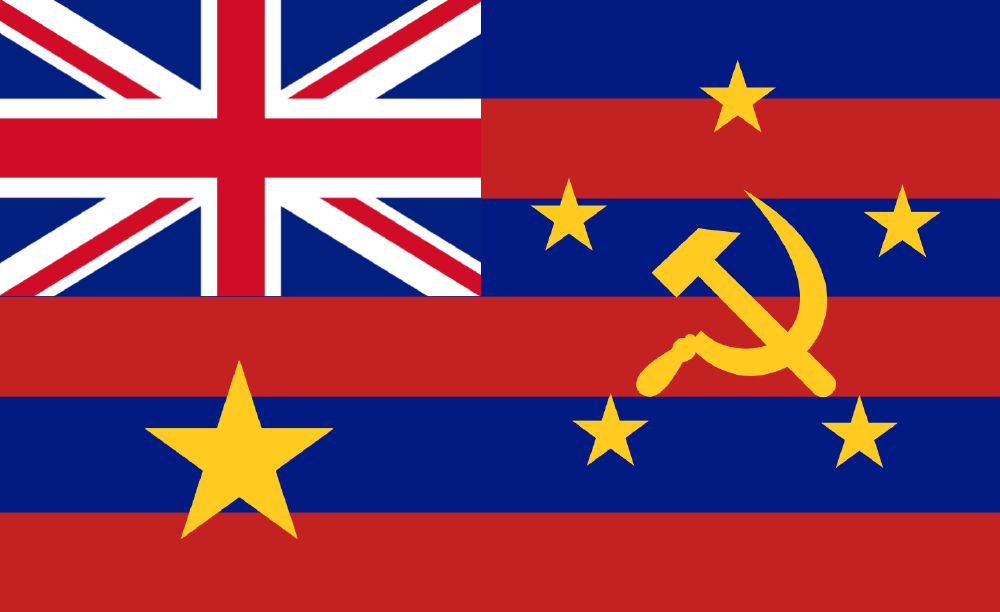| National Factbook |
| Flag: |

|
| Nation Name: |
The CommonweaIth |
| Leader Name: |
Bute Hole |
| Currency: |

Australian Dollar |
| National Animal: |

Swan |
| History: |
After decades of corruption, mismanagement and failure to represent the people that elected their leaders. Faith in their politicians and Democracy to a lesser extent, in Australia, had waned to a point of apathy among the nation's people. The same party was regularly voted back into power to keep the status quo. Although this had been the trend for the latter half of Australia's independence, the last 2 decades of Australia saw little to no GDP growth and even inverse growth as well as living conditions declining as climate change riddled the nation with very destructive flooding and fires ruining crops and cattle and destroying homes and families.
The damage of climate change had little effect on the government's dealings with the worst producers of carbon emissions. As long as the government allowed the mining companies to operate as easily as they were, the mining companies would reimburse them generously through pay-outs to the politicians and royalties to the budget, the politicians got rich, the government got rich and the mining conglomerates got rich. It was a win-win-win all at the expense of the average citizen.
The disdain and sheer hatred of the political system that ruled their life was great for the average Australian. As more and more climate disasters riddled families, communities and farmland. More and more unrest happened. It started off as mass protests against the mining companies and other major corporations that contributed to the suffering of the Australian populace, such as price-gouging supermarket chains. But soon it moved on to the government itself. Massive swarms of protestors obstructing government offices and other facilities.
This was all a powder keg, waiting for a single spark so it could explode. And that’s what happened. A mass protest blocking legislators and government officials from entering Capitol Hill triggered a response from the police and the several security details that turned the peaceful albeit obstructive protest into a revolution.
Over 13,000 protesters were at Capitol Hill alone along with close to another 100,000 throughout the city of Canberra that had come from across the country to protest, effectively making up 1/4th of the entire city’s population. It started off with organized pushes from the police but as they attempted to disperse the crowd with tear gas and water cannons, that’s when panic ensued. People attempted to spread out, they fled into the greater Canberra area and started rioting. A few hundred charged the police in between them and the parliament building and that encouraged the many other hundreds of protesters in the area to join in on the charge. The few hundred police officers stood no chance against the thousands of furious rioters wanting their democracy back.
The media was reporting from all over the city, videos of buildings in flames, cars being overturned, and police being tied up with their own handcuffs and cable ties. That’s when the most infamous moment in the Black Swan Revolution happened. Almost all channels across the country showed the burning of the parliament building. It was completely on fire; the skies were red with heat and grey with smoke. Shortly after, a state of Emergency was declared. The military was deployed and everyone was told to stay in their homes.
At this point, every major city in the country had thousands of people rioting, calling for the abolition of Australia and the creation of a people’s republic. The people had had enough and when the military did show up, most of them stood down from engaging with the rioters but instead showed their support and that they stood with the protesters.
The rioting ensued for almost a week, and government officials and wealthy CEOs fled the country with what they could. Cities across the country were on fire and there was only chaos, no order in sight. Hundreds of thousands had been displaced and were in refugee conditions.
That’s when the military stepped in to establish a temporary Military Junta to establish order before the democratic process could resume. The people and the military were two peas in a pod, the military was uniform but supported the desires of the people and could therefore allow for a competent and peaceful government until the country was ready.
The Black Swan Revolution was over and from the fire and ash was born a new nation, a new people. The Commonwealth. Deriving its name from the Commonwealth of Nations, an international association of former colonies of the British Empire. This new Commonwealth seeks to establish a new empire, not for the ruling elite but for the people of the world.
The junta believed in an idea similar to that of South Korea’s rise to power, that you cannot have a healthy democracy without a strong economy. So, it set forth to build an economy with the people at the core of it. The nation struggled at first, after the rioting and destruction, the established economy had its foundation all but destroyed and so short-term loss was allowed by the people for long-term prosperity.
Workers were assigned to governmental development boards to ensure the people had their voices and ideas heard. Small worker's coops were all that were around for the first few years as the government didn’t have the power or oversight to manage a planned economy nor could the people influence a junta-led planned economy, so it was deemed unfit until the democratic process was reinstated. By 2033, the Commonwealth had recovered to the former glory of the Australian economy, but workers had more wealth, power and rights and so the junta, after their 12-year reign, set up free and fair elections with technocrats being heavily involved in government and qualifications for all political positions required so only professionals that know what they are doing can be elected, not demagogues and populists as the former country had elected. |
| Geography |
| Continent: |
Australia |
| Land Area: |
173,808.72 sq. km |
| Terrain: |
|
| Highest Peak: |
,
0 meters
|
| Lowest Valley: |
,
0 meters
|
| Climate: |
|
| People & Society |
| Population: |
14,230,571 people |
| Demonym: |
Commonwealther |
| Demonym Plural: |
Commonwealthers |
| Ethnic Groups: |
Commonwealther - 86.2%
Indian - 9.6%
Japanese - 1.4% |
| Languages: |
English - 95.2%
Hindi - 3.0%
Japanese - 0.4% |
| Religions: |
Atheism - 64.2%
Christian - 22.5%
Hinduism - 9.4% |
| Health |
| Life Expectancy: |
94 years |
| Obesity: |
8.5% |
| Alcohol Users: |
62.9% |
| Tobacco Users: |
5.7% |
| Cannabis Users: |
67.3% |
| Hard Drug Users: |
4.9% |
| Economy |
| Description: |
The economy of The Commonwealth is exceptionally socialist. Every 12 months, fiscal policy packages are proposed, by a select few groups of the best and brightest technical experts in all fields with the help of the nation's top economists, to the general public to be voted on. This is done so that the general public does not need to be an expert economist to understand what they are voting on nor do they need to research tens or even hundreds of different packages to accurately vote according to their wants and needs.
There are no private businesses in The Commonwealth as all private property is owned and run by the people through the democratic decision-making process and technical expert advice and guidance. The Commonwealth has developed a terrible reputation among foreign corporations for stealing technology, ideas and assets from any businesses operating inside the country. When The Commonwealth was still open to foreign corporations, it was a one-sided and hostile business environment for foreign corporations as the government subsidised or owned most private property and would heavily tax and regulate foreign companies until they inevitably abandoned the country leaving their assets behind to be taken by the state.
Worker productivity is incredibly high in The Commonwealth as all workers are compensated exceptionally well compared to their capitalist counterparts which makes their morale much higher, automation has also been embraced in its entirety. Any job that can be filled with a robot has been and any job that could be is having a lot of time, resources and effort invested into it to figure out how meaning the vast majority of less value-producing jobs have been filled by cheap and much more efficient automated processes. This has in turn made much fewer jobs available but to make up for this shortcoming and to take advantage of it, employing practices have changed. The average worker works between 4 and 5 hours a day and only works between 3 and 4 days a week. They have the ability to take a lot more time off and are a lot more healthy from the reduced stress of a big workload and the ability to take breaks almost at will to relax and take care of themselves.
The Commonwealth is heavily involved in technology and it is used in all facets of day-to-day life. Self-sustainability and the well-being of all people are the absolute top priority for all business occurring in the country, products are made to be of the best possible quality they can be to ensure they last a long time and are not wasted. Recycling is very important in The Commonwealth so any product that can be is designed so that it will be recycled to as much of its original resources as possible.
Greed and resentment, from foreign corporations and Western nations, have led to the economy being closed off from Western nations, The Commonwealth has developed autarky in all fields except for some basic and refined raw resources. There are very few exports to foreign nations as domestic demand is the only priority. Some national products are still found in foreign countries, typically highly developed ones where people can afford to transport them there illegally, with smartphones and computer parts being the most commonly searched for on this black market. Although the infrastructure for these products is limited in foreign countries, products are designed with customizability and global standards in mind making them pretty well-functional in foreign nations. |
| Average Yearly Income: |
$145.54 |
| Gross Domestic Product (GDP): |
$43,098,131,013.00 |
| GDP per Capita: |
$3,028.56 |
| Gross National Income (GNI): |
$23,995,459,160.00 |
| Industries: |
The Commonwealth produces almost every single thing seen in its borders under state companies with the exception of some basic and refined raw resources. Due to The Commonwealth's focus on long-lasting and high-quality products, most consumers only buy a product from each industry a few times in their life.
The mining sector is the biggest in The Commonwealth, accounting for 13% of GDP, this has been achieved from the limitless expansion afforded by having large swathes of resource-rich but inhospitable land. Autarky is a major focus of The Commonwealth so raw resource extraction is given a lot of bonuses and priorities to ensure demand is met as the country may not be able to meet demand with the limited help of the global market.
The personal computing industry is the second biggest consisting of 11% of GDP, this involves all computing devices for everyday consumers such as PCs, tablets, smartphones, laptops and associated accessories, this market is incredibly large due to the rapid development of technology and just how integrated technology is with day to day life in The Commonwealth meaning most consumers tend to upgrade within 5 years of acquiring that device.
The third biggest industry in The Commonwealth is the housing market making up 9% of GDP, although housing is guaranteed and the costs to rent only consist of utilities and maintenance of the property. The vast majority of citizens still opt to purchase their own homes, typically designed to their likes and have them constructed on empty plots of land or on plots of land with outdated home designs/safety standards that are vacant. Because this is still an expensive process, albeit one that happens once in a lifetime, it makes for a large market.
The fourth biggest industry is tourism contributing 8% of GDP. Although The Commonwealth doesn't export much to the rest of the world, is it very well known among the general populations of developed nations. Whether it be for its extraordinary laxness in restricting personal freedoms or its exquisite combination of architecture and geography. It makes for a great place for tourists to explore, learn about or just do things they might not be allowed to do anywhere else. |
| Military |
| History: |
The Commonwealth maintains a rather large standing army for its size as the threat of American imperialism is high. While the standing force is large during peace, a constitutional ability allows for a draft of 21 to 35-year-olds during total war circumstances to ensure the security and sovereignty of the people of The Commonwealth.
Serving in the armed forces is seen as one of the highest honours in The Commonwealth as the military is constantly being utilised overseas to assist the people of nations with aid and interventions. The populace of The Commonwealth sees the armed forces as the true protectors of liberty and liberators from tyranny and local populations often praise the assistance of the armed forces.
Intervention is done typically in coups or civil unrest and always on the side of the people. The military isn’t always fighting coups but is mostly spread across the globe, primarily in Africa and South-East Asia, supporting newly found governments to ensure democracy and freedom to the people and so no foreign influence or powerful figures can take control during these vulnerable times. Of course, during this period some decisions, in the people's best interest, are made for them but what they don't know can't hurt them.. |
| Soldiers: |
0 |
| Tanks: |
18,000 |
| Aircraft: |
2,700 |
| Ships: |
0 |
| Missiles: |
0 |
| Nuclear Weapons: |
0 |
| Last Updated: 10/17/2023 06:46 pm |














